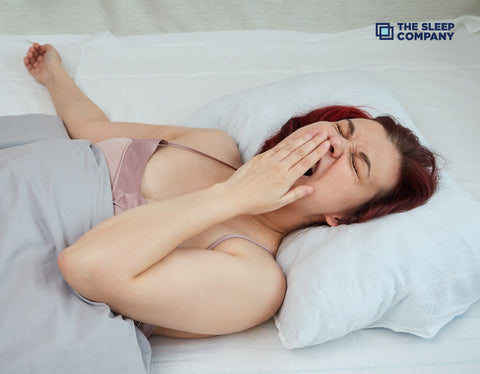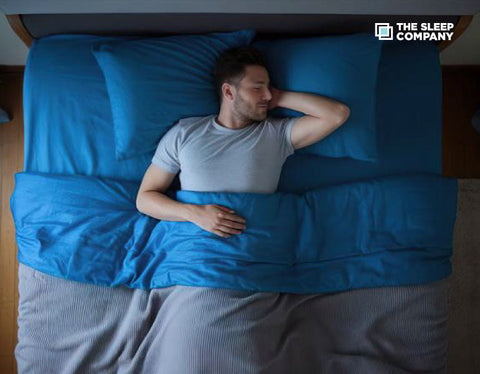My Cart

How Does a Gluten-free Diet Affect Sleep?

Good food is a good mood. This is true in every aspect. Our food choices impact our emotions and lifestyle. Gone are the days when our meals used to be simple and basic. Today, the food we eat can bring complexity to our day-to-day lifestyles and ultimately affect our overall well-being. The growing health awareness has transformed the traditional concepts of food and meals. People are becoming more proactive in their food choices.
For centuries, most Indians have been eating food like wheat and barley, which are considered staple foods in India. However, there is still some propaganda around healthy food that people don't really understand fully. And ignore the overall health and well-being consequences that certain foods can cause. The concept of a gluten-free diet is now getting popular. It came to India mainly through the recognition of celiac disease (CeD) and the increasing adoption of Western medical practices. But what exactly is a gluten-free diet, and can it also affect your sleep? Lets dive into this.
What is a Gluten-free diet?
To understand the concept of a gluten-free diet, we need to explore more about the term Gluten. Gluten is a kind of protein that can be found in certain foods like bread, wheat, barley, dairy products, and many more. It basically acts like a glue that holds the food together and gives it that chewy and stretchy texture.
For most people, gluten doesn't harm or affect them, but for some, it can cause inflammation and indigestion, leading to severe stomach conditions. Some individuals suffer from coeliac disease and are gluten-intolerant; they cannot include gluten in their diet at all. And thats the reason they prefer a gluten-free diet. A gluten-free diet is nothing but a diet that doesnt include food with gluten in it. People who eat a gluten-free diet often avoid bread, dairy products, wheat, pasta, baked food, beer, malt, and some processed foods.
What are Gluten-free foods?

Gluten-free foods are those foods that dont contain a special kind of protein (gluten). Most of the foods are naturally gluten-free. Some of the gluten-free foods are:
- Rice (all kinds)
- Quinoa
- Corn and cornmeal
- Millet
- Buckwheat (not related to wheat)
- Gluten-free oats (labeled as such)
- Amaranth
- Sorghum
- Tapioca
- Arrowroot
- Tofu
- All fresh fruits (like apples, bananas, oranges, berries)
- Nuts and seeds (plain, unflavored)
Can a gluten-free diet affect sleep?
A gluten-free diet can affect your sleep in so many ways. People with gluten sensitivity often find it difficult to get a peaceful sleep at night. For them, switching to a gluten-free diet helps them to have a good night's sleep without any health issues.
People with undiagnosed gluten intolerance frequently complain of poor sleep quality. Many suffer from insomnia, difficulty falling asleep, or frequent night awakenings. The fundamental cause is gluten's ability to upset the gut, resulting in pain and inflammation throughout the body, which affects sleep hormones and general alertness.
These people frequently observe an improvement in their sleep patterns after cutting gluten out of their diet. It may be simpler to fall and stay asleep if you have less bloating, fewer stomach problems, and a more tranquil digestive system. A gluten-free diet can also improve nutrient absorption, particularly for sleep-regulating nutrients like vitamin B6 and magnesium, which promote better sleep.
It's crucial to remember that not everyone will experience the same advantages from a gluten-free diet. Unnecessarily eliminating gluten may not improve sleep for people who are not gluten sensitive, and if not properly planned, it may even result in nutritional deficiencies.
How does a gluten-free diet improve your sleep quality?

1.Reduces inflammation discomfort: Gluten can lead to inflammation in the body and gut, which can result in unease, bloating, and digestive issues. It may be more difficult to fall or stay asleep if you have these symptoms. Many people report reduced pain and improved sleep quality after cutting out gluten.
Enhances Nutrient Absorption: Gluten damages the small intestine in coeliac disease, which makes it difficult for the body to absorb vital nutrients like potassium, calcium, and magnesium that are necessary for healthy sleep. A gluten-free diet promotes better absorption of these nutrients and aids in gut healing.
Reduces Sleep Disturbances: Research indicates that initiating a gluten-free diet helps children and adults with coeliac disease sleep better, falling asleep more quickly, staying asleep longer, and experiencing fewer nighttime disruptions.
Reduces Restless Legs Syndrome (RLS): RLS, which can interfere with sleep, is more common in people with coeliac disease. A gluten-free diet could lessen these symptoms.
Key Ways a Gluten-Free Diet Improves Sleep
|
Mechanism |
Effects on sleep quality |
|
Reduces digestive discomfort |
Fewer awakenings, easier sleep onset |
|
Lower Inflammation |
Improved sleep duration and quality |
|
Enhances nutrient absorption |
Supports neurotransmitter and hormone balance |
|
Reduces RLS and OSA symptoms |
Fewer sleep disruptions, longer sleep |
|
Improves energy levels |
Less daytime fatigue, better overall rest |
Final Thoughts
A gluten-free diet and sleep quality have a fascinating and nuanced relationship. By lowering inflammation, digestive discomfort, and associated symptoms like restless legs syndrome, a gluten-free diet can significantly improve sleep for people with coeliac disease or non-celiac gluten sensitivity. After removing gluten from their diets, many members of these groups report improved sleep, including easier sleep, longer sleep duration, and fewer awakenings.
It's crucial to understand that not everyone benefits from a gluten-free diet in terms of sleep. Even after gluten is eliminated, some people may continue to experience sleep disturbances, according to some studies, despite others showing noticeable improvements. Sleep quality can still be impacted by things like chronic stomach pain, problems with nutrient absorption, or other underlying medical conditions. This emphasises the value of a comprehensive strategy that includes dietary adjustments, healthy sleep practices, and attention to gut health in general.
There is little proof that a gluten-free diet will enhance sleep for people without coeliac disease or gluten sensitivity. Before making significant dietary changes, speak with a healthcare provider if you think gluten is interfering with your sleep. You can find out if gluten is causing your sleep problems by keeping a symptom and sleep journal, consulting a registered dietitian, and thinking about an elimination diet under supervision.
In the end, a healthy diet really does create the conditions for a positive attitude and sound sleep. Regardless of whether gluten is the cause, paying attention to what you eat and making wise decisions can have a significant effect on your general health and sleep quality. A healthy, vibrant life depends on both sleep and nutrition, so pay attention to your body, get professional advice, and keep these points in mind.




























































